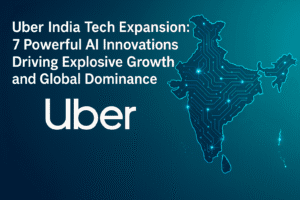Uber India Tech Expansion: 7 Powerful AI Innovations Driving Explosive Growth and Global Dominance
Uber plans to double its India-based tech workforce within 3–5 years, highlighting the country’s strategic role as a global innovation hub. The company’s Bengaluru engineering center, established in 2014, already employs 2,200 professionals across AI, data science, and product development—a figure that has doubled since 2022. Global CTO Praveen Neppalli Naga credited India’s “high-quality, scalable talent pool” for driving Uber’s growth, with teams contributing to hyperlocal features like cash payments and safety tools later adopted globally. The expansion aligns with Uber’s AI ambitions, including proprietary models leveraging its vast mobility and delivery data to refine pricing, routing, and user personalization, though privacy safeguards remain a priority.
However, competition for skilled engineers intensifies as Indian startups and rivals like Ola and Swiggy vie for the same talent. The move reinforces India’s emergence as a critical R&D base for global tech firms, combining cost efficiency with problem-solving expertise honed in complex markets. Uber’s investment signals confidence in India’s dual role as a talent powerhouse and a testing ground for innovations poised to shape the future of global mobility and logistics.

Uber India Tech Expansion: 7 Powerful AI Innovations Driving Explosive Growth and Global Dominance
In a significant move underscoring India’s growing prominence as a global tech hub, Uber announced plans to double its India-based technology workforce over the next 3–5 years. Praveen Neppalli Naga, Uber’s Global Chief Technology Officer for Mobility and Delivery, revealed the strategy during his inaugural visit to the country, emphasizing India’s critical role in driving innovation for the ride-hailing giant.
India’s Talent Ecosystem Fuels Uber’s Growth
Since establishing its Bengaluru engineering hub in 2014, Uber’s India team has grown exponentially, now employing 2,200 professionals across engineering, data science, product management, and design. This figure marks a 100% increase from just three years ago. Naga attributes this growth to India’s “high-quality, scalable engineering talent,” a sentiment echoed by global tech leaders increasingly investing in the country. With over 1.5 million STEM graduates annually, India’s talent pipeline remains a magnet for companies seeking to bolster R&D capabilities while navigating global tech skill shortages.
Uber’s expansion aligns with broader trends: Google, Amazon, and Microsoft have all scaled their India teams, leveraging local expertise to drive global products. For Uber, India’s tech hub isn’t merely a cost-efficient outpost but a strategic innovation center. Local teams have already contributed to hyperlocal features, such as cash payments and safety tools tailored to regional needs, which later influenced global product updates.
AI Ambitions and the Data Advantage
A key driver of Uber’s hiring spree is its artificial intelligence (AI) roadmap. Naga hinted at developing proprietary AI models using the company’s vast datasets, which include real-time traffic patterns, pricing algorithms, and user behavior insights. Such models could refine route optimization, delivery logistics, and personalized user experiences. For instance, AI-driven demand forecasting might better align driver availability with peak commute times in Mumbai’s chaotic traffic or optimize meal delivery routes during Bengaluru’s monsoon season.
However, Naga stressed the need to balance innovation with privacy safeguards, particularly as India’s Digital Personal Data Protection Act (2023) comes into effect. Uber’s AI initiatives will likely require robust data anonymization frameworks to maintain user trust while complying with evolving regulations.
Challenges in a Competitive Landscape
While Uber’s plans signal confidence, challenges loom. The battle for top tech talent is intensifying, with Indian startups and global rivals like Ola, Swiggy, and Zomato vying for the same pool of engineers and data scientists. To attract candidates, Uber may need to offer competitive perks, upskilling programs, and opportunities to work on globally scalable projects.
Infrastructure hurdles, such as uneven internet connectivity and urban traffic congestion, also pose indirect challenges. Yet these complexities make India an ideal testing ground for resilient tech solutions. Innovations born from navigating Bengaluru’s traffic jams or Delhi’s diverse user demographics could strengthen Uber’s global offerings.
Broader Implications for India’s Tech Economy
Uber’s expansion reinforces India’s position as a “lab for the world,” where global companies trial innovations tailored to demanding, high-growth markets. The hiring surge will likely spur job creation not only in metro hubs but also in emerging cities like Hyderabad and Pune, where tech ecosystems are flourishing. Additionally, partnerships with Indian academic institutions or startups could emerge, fostering skill development and collaborative R&D.
Looking Ahead
Uber’s commitment to India reflects a strategic bet on the country’s dual role as both a talent powerhouse and a market ripe for tech-led disruption. As the company scales its local team, the focus will hinge on translating India-specific insights into global advancements, particularly in AI and mobility solutions. For India, Uber’s investment signals deeper integration into the global tech value chain—one where homegrown expertise drives worldwide innovation.
In the race to dominate tomorrow’s tech landscape, Uber’s India story is more than a hiring statistic; it’s a testament to the country’s rising influence in shaping how the world moves.
You must be logged in to post a comment.